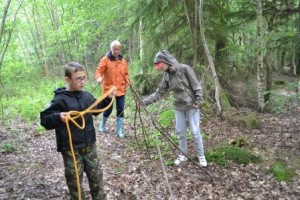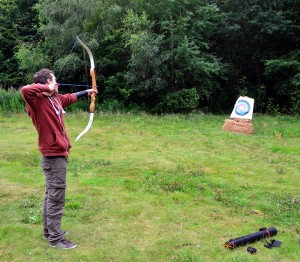Forest Schools in the U.K.

The history of forest schools in the UK dates back to the 1800s, but it is only in the last 20 years that their organisation and scale have significantly developed. Forest schools are about learner-led activities in an outdoor natural space, ideally small woodlands, over an extended period of time. For example, forest school activities can include tree identification, shelter building, butterfly hunts, and animal track spotting. In recent years forest schools have exploded in popularity and they work alongside traditional classroom approaches. At the heart of the forest school ethos is an emphasis on offering every learner a regular opportunity to achieve.
All forest schools get young people outdoors. This is critical for children coming from urban environments who are often unable or unwilling to take part in outdoor adventures. Forest school learning develops outdoor skills, gives young people responsibility, and they learn about, cooperation and negotiation. Everyone at a forest school will think about and learn about risk.
 Although forest schools are not controlled or run by one governing body or organisation, they are usually led by a qualified Level 3 Forest School Practitioner. Moreover, the Forest School Association (FSA) outlines some key principles for forest schools in their guidance and training of practitioners. Of course the way in which each practitioner will put together a forest school programme will be very different, but the 180 hour Level 3 qualification is designed to ensure that the practitioner sets up a stimulating and suitable forest school programme and is able to manage a forest school site sustainably.
Although forest schools are not controlled or run by one governing body or organisation, they are usually led by a qualified Level 3 Forest School Practitioner. Moreover, the Forest School Association (FSA) outlines some key principles for forest schools in their guidance and training of practitioners. Of course the way in which each practitioner will put together a forest school programme will be very different, but the 180 hour Level 3 qualification is designed to ensure that the practitioner sets up a stimulating and suitable forest school programme and is able to manage a forest school site sustainably.
The diversity of natural resources in small woodlands means they are ideal for forest schools. However, forest schools can and do run in other natural environments. Forest schools are often run as commercial businesses, sometimes relying on grants from local councils, benevolent woodland owners, and partnerships with local schools.
The mainstream is becoming attuned to the fact that forest schools offer an opportunity to achieve for those who might not do well in the traditional classroom environment, and they provide a way for children to enjoy the countryside and small woods in ways that are becoming increasingly out of reach. As the benefits of forest schools become more widely appreciated, it is likely that their growth will continue but they are by their nature somewhat resistant to regimental organisation. What is in little doubt is that more suitable forest school sites are much needed.
Comments are closed for this post.

I passed my Level 3 course last year and after moving down to the SW have access to a 10 acre wood that belongs to my in-laws. They have given me the go ahead to use it to run my own FS. While training I met another lady who owns her own wood, but on applying for change of use she has been denied as they say her wood is in the green belt. My concern is that the wood I want to use is also in the green belt, but is also ancient.
She lives in a different part of the country to me, so I was wondering if anyone had any advice on how to proceed in approaching the local council to get the change of use needed. It has been a dream for quite a while to go down this route (I have been a teacher for 9 years) and it would be gutting to fall at the first hurdle!
Many thanks, Jim
Jim
29 March, 2018